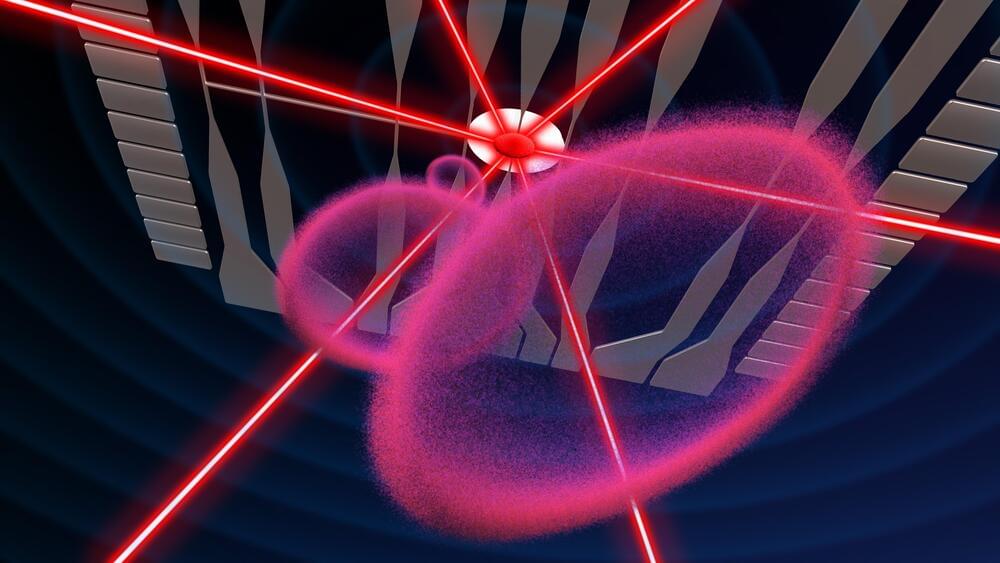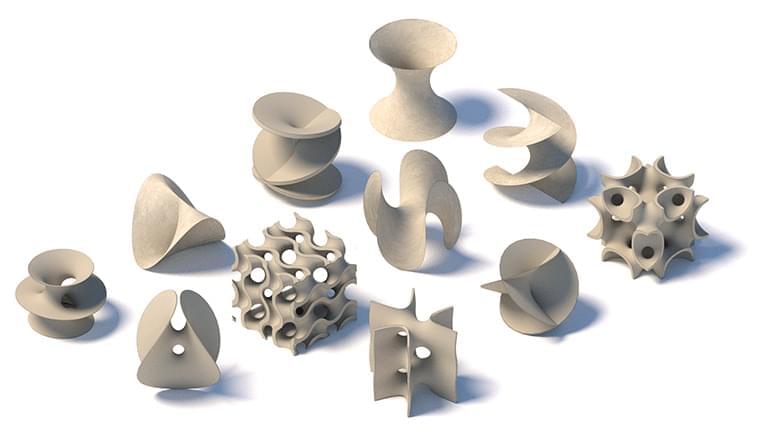Jun 22, 2022
MIT’s new computer chip design lets you clip on parts like LEGOs
Posted by Quinn Sena in category: computing
This kind of reconfigurable design could reduce electronic waste and allow one chip to be used for multiple applications.
This kind of reconfigurable design could reduce electronic waste and allow one chip to be used for multiple applications.

Inside NASA’s Cold Atom Lab, scientists form bubbles from ultracold gas, shown in pink in this illustration. Lasers, also depicted, are used to cool the atoms, while an atom chip, illustrated in gray, generates magnetic fields to manipulate their shape, in combination with radio waves.
Credit: NASA/JPL-Caltech
Continue reading “Ultracold Bubbles on Space Station Open New Avenues of Quantum Research” »
When our phones and computers run out of power, their glowing screens go dark and they die a sort of digital death. But switch them to low-power mode to conserve energy, and they cut expendable operations to keep basic processes humming along until their batteries can be recharged.
Our energy-intensive brain needs to keep its lights on too. Brain cells depend primarily on steady deliveries of the sugar glucose, which they convert to adenosine triphosphate (ATP) to fuel their information processing. When we’re a little hungry, our brain usually doesn’t change its energy consumption much. But given that humans and other animals have historically faced the threat of long periods of starvation, sometimes seasonally, scientists have wondered whether brains might have their own kind of low-power mode for emergencies.
Now, in a paper published in Neuron in January, neuroscientists in Nathalie Rochefort’s lab at the University of Edinburgh have revealed an energy-saving strategy in the visual systems of mice. They found that when mice were deprived of sufficient food for weeks at a time — long enough for them to lose 15%-20% of their typical healthy weight — neurons in the visual cortex reduced the amount of ATP used at their synapses by a sizable 29%.

[Epistemic Status: written off the top of my head, thought about it for over a decade]
What do we desire for a theory of consciousness?
TSMC is further increasing its footprint in Taiwan by building four more facilities valued at $10 billion apiece in its production hub in Tainan, intended for the manufacture of 3-nanometer chips.
Apple chip partner TSMC has been working to expand production in a bid to address the global chip shortage. While attempts elsewhere in the world are slowly progressing, work in its native Taiwan is going at a much faster pace.
Following the completion of four new facilities in an industrial park in the city of Tainan as part of TSMC’s production hub, the company is starting construction on another four fabs, reports Nikkei Asia. Each of the construction projects will reportedly cost TSMC around $10 billion, and forms part of a $120 billion investment spree.
Actually transporting quantum states over significant distances is tricky, though. Researchers have had some success transmitting messages tied up in the quantum states of photons over several hundred miles of optical cables, and also using satellite quantum communication to establish links over even greater distances. But the inevitable signal losses over either mode of communication mean that scaling up to the distances required for a true internet will be tricky.
One workaround is to exploit another quantum phenomenon called teleportation. This works much like the sci-fi concept used in shows like Star Trek, allowing information to be instantaneously transmitted from one place to another, theoretically over unlimited distances. And now, researchers from the Netherlands have provided the first practical demonstration of how this could work.
The team set up three quantum “nodes” called Alice, Bob, and Charlie, which are able to store quantum information in qubits—the quantum equivalent of bits in a computer made from nitrogen vacancy centers. These are tiny defects in diamonds that can be used to trap electrons and alter their quantum state. They then connected Alice to Bob and Bob to Charlie using optical fibers.
How small is a TRANSISTOR exactly? Companies like Intel and AMD talk about transistors being 2 or 3 nanometers large, but is that actually how small they are? In this video, we’re going to zoom in on the smallest devices and technologies that drive our modern world.
If you’re wondering why some devices are out of order in regards to size, here’s the reason. The order of devices shown is primarily organized by decreasing size, however sometimes we prioritize the year in which the technology was commercialized, and then a couple times we order the objects based on the flow of the animation.
Continue reading “Technology Size Comparison🤯🤯 3D Animation” »
Researchers from the University of Nebraska-Lincoln and the University of California, Berkeley, have developed a new photonic device that could get scientists closer to the “holy grail” of finding the global minimum of mathematical formulations at room temperature. Finding that illusive mathematical value would be a major advancement in opening new options for simulations involving quantum materials.
Many scientific questions depend heavily on being able to find that mathematical value, said Wei Bao, Nebraska assistant professor of electrical and computer engineering. The search can be challenging even for modern computers, especially when the dimensions of the parameters—commonly used in quantum physics—are extremely large.
Until now, researchers could only do this with polariton optimization devices at extremely low temperatures, close to about minus 270 degrees Celsius. Bao said the Nebraska-UC Berkeley team “has found a way to combine the advantages of light and matter at room temperature suitable for this great optimization challenge.”
Stanene is a topological insulator comprised of atoms typically arranged in a similar pattern to those inside graphene. Stanene films have been found to be promising for the realization of numerous intriguing physics phases, including the quantum spin Hall phase and intrinsic superconductivity.
Some theoretical studies also suggested that these films could host topological superconductivity, a state that is particularly valuable for the development of quantum computing technology. So far, however, topological edge states in stanene had not been reliably and consistently observed in experimental settings.
Researchers at Shanghai Jiao Tong University, the University of Science and Technology of China, Henan University, Zhengzhou University, and other institutes in China have recently demonstrated the coexistence of topological edge states and superconductivity in one to five-layer stanene films placed on the Bi(111) substrate. Their observations, outlined in a paper published in Physical Review Letters, could have important implications for the development of Stanene-based quantum devices.